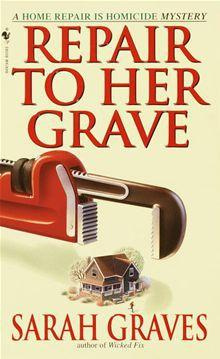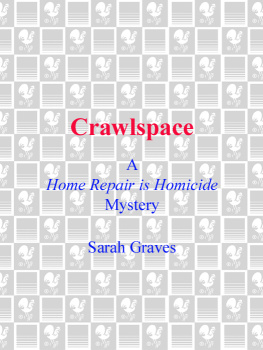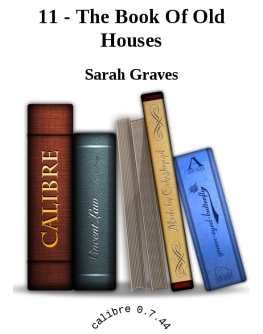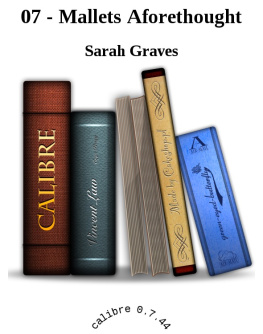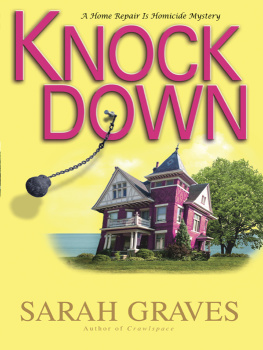Sarah Graves - Wicked Fix (Home Repair Is Homicide Series #3)
Here you can read online Sarah Graves - Wicked Fix (Home Repair Is Homicide Series #3) full text of the book (entire story) in english for free. Download pdf and epub, get meaning, cover and reviews about this ebook. publisher: Random House Publishing Group, genre: Detective and thriller. Description of the work, (preface) as well as reviews are available. Best literature library LitArk.com created for fans of good reading and offers a wide selection of genres:
Romance novel
Science fiction
Adventure
Detective
Science
History
Home and family
Prose
Art
Politics
Computer
Non-fiction
Religion
Business
Children
Humor
Choose a favorite category and find really read worthwhile books. Enjoy immersion in the world of imagination, feel the emotions of the characters or learn something new for yourself, make an fascinating discovery.
- Book:Wicked Fix (Home Repair Is Homicide Series #3)
- Author:
- Publisher:Random House Publishing Group
- Genre:
- Rating:5 / 5
- Favourites:Add to favourites
- Your mark:
- 100
- 1
- 2
- 3
- 4
- 5
Wicked Fix (Home Repair Is Homicide Series #3) : summary, description and annotation
We offer to read an annotation, description, summary or preface (depends on what the author of the book "Wicked Fix (Home Repair Is Homicide Series #3) " wrote himself). If you haven't found the necessary information about the book — write in the comments, we will try to find it.
Wicked Fix (Home Repair Is Homicide Series #3) — read online for free the complete book (whole text) full work
Below is the text of the book, divided by pages. System saving the place of the last page read, allows you to conveniently read the book "Wicked Fix (Home Repair Is Homicide Series #3) " online for free, without having to search again every time where you left off. Put a bookmark, and you can go to the page where you finished reading at any time.
Font size:
Interval:
Bookmark:
With her tortilla, Ellie was having a tomato and mesclun salad with blue cheese dressing, and a Dos Equis. "And I don't see," she added, "why he had to come now." Beside me, my son, Sam, went on attacking his combination plate. "You could strip varnish with this hot sauce," he remarked appreciatively; at seventeen, Sam thought flaming coals weren't quite hot enough unless you doused them in Tabasco. "Reuben's like a bad rash," Ellie's husband, George Valentine, said. "He comes back." He cut a slice off his well-done ribeye steak; to George, the French fry is about as foreign as food needs to get, with the possible exception of the English muffin. "The trick," he added, "is getting rid of him again.
But this time I hear he means to stay." At which my friends all sighed sorrowfully. Reuben Tate was the sly, grinning worm in the apple of their happiness that autumn, and it seemed unfair just when everything else in town was looking up: Summer had come and gone but we still had the taste of it in our mouths, tart and sweet as a drop of lemonade. Dahlias with bright shaggy heads big as dinner plates bloomed in the perennial beds; ripe tomatoes loaded the vines in our back gardens, and the rosebushes massed along the seawall bowed low under their heavy burden of rose hips, huge and juicy as Bing cherries. Also, for once the town had cash. Sea urchins and sardines had been freakishly plentiful that season, the boats coming back half-capsized by the unaccustomed weight of their catches, and scallop harvest promised to be as bountiful. Until then, foreign freighters--their names, unpronounceable, stenciled in white, rust mottled Cyrillic letters on their towering sterns-- loomed at dockside, loading paper pulp and particle board from the mills up in Woodland, making overtime for the stevedores and truckers.
Finally, at September's end came the annual Eastport Salmon Festival, the last outdoor bash of the year on our little island in Maine, which meant that cash registers in the cafes and shops on Water Street would soon be jingling with tourist money. So we were content. Only the thought of Reuben with his quick, twitchy ways, his pale, wandering eye and odd laugh--a harsh, painful-sounding bark like a strangled cough; when he uttered it, he meant to hurt someone--kept putting a damper on people. "Could be this time Reuben's luck will run out," said my main squeeze, Wade Sorenson. Just off the water after guiding a cargo vessel into port--it's what he does, as Eastport's official harbor pilot--Wade wore a navy turtleneck, jeans, and a cable-knit sweater the color of vanilla ice cream. "Not soon enough," my ex-husband, Victor Tiptree, said sourly, and I glanced at him in surprise. "Reuben Tate's luck," he emphasized, "can't end soon enough for me." "How do you know Reuben?" I asked, and the others around the table looked inquisitively at him, too. "Reuben Tate's luck," he emphasized, "can't end soon enough for me." "How do you know Reuben?" I asked, and the others around the table looked inquisitively at him, too.
Six months earlier, Victor had moved here to Eastport from the Upper East Side of Manhattan, and in remote, thinly populated downeast Maine his arrival had of course been newsworthy. But I hadn't thought any of the local people were newsworthy to Victor, and especially not a ne'er-do-well like Reuben. Tonight, Victor's dinner had consisted of the olives from his martinis. "It's not important," he muttered, and gulped the melted ice from his glass. Annoyed but determined not to argue--the rule, when dealing with Victor, is never wrestle with a pig; you both get dirty and the pig likes it--I turned away, as a voice from the next table rose in worried complaint. "Did Reuben really say that?" Paddy Farrell, who ran a textile design studio out of an old canning factory building he'd rehabilitated down on the waterfront, had clearly been listening in on our conversation.
Sitting with Paddy was his longtime companion, Terence Oscard. "Did he?" Paddy demanded, his close-clipped salt and-pepper head coming up pugnaciously as he caught my eye. "He's staying?" Paddy wore a navy blazer and a tailored button down shirt, a maroon silk scarf at his throat. "George?" he persisted as George stolidly went on chewing. "Did you actually hear him say that?" "What I said," George confirmed after a sip of Miller Lite. "Stayin' in his mom's old place out in Quoddy Village, got the little trust fund she left him to live on.
It ain't much, but I guess that's nothing new to Reuben. He's never had any job at all, that I've known of." Terence Oscard, a big-boned, pale-haired man with a beaky nose and a big, pointy Adam's apple, wore a light blue chambray shirt, khaki slacks, and Topsiders. Good-looking in the way some very ugly men can be, his jutting features regularized by intelligence and kindness, he sat listening with his usual thoughtful attention. But Paddy seemed agitated. "Reuben can't do that. Why, the town won't be worth living in.
It'll be the bad old days all over again." Terence leaned over to me. "I've got a new Red Cross first-aid book," he confided. "I'll be glad to lend it to you when I've finished it." He was a martyr to numerous imaginary ailments and, perhaps on account of these, a self-taught first-aid expert. I liked him a great deal; everyone did. "Thanks, Terence, I'll look forward to it," I said, and he sat back, pleased. "Don't see as there's much we can do about Reuben sticking around if he wants to," George said, his tone unperturbed as he went on eating his steak and potatoes. "Still a free country." I noticed, though, that George didn't raise his eyes, a sign that he wasn't enjoying Paddy's conversation. "Still a free country." I noticed, though, that George didn't raise his eyes, a sign that he wasn't enjoying Paddy's conversation.
Paddy was intense, quick to anger, and inclined to pound the table, while George was the opposite: the quieter he became, the more tactfully and carefully you'd better go, or eventually he would lower the boom on you. "Unless," George added to Paddy, "you've got some brilliant new idea." At this, the air around us seemed to grow darkly electric, charged with some knowledge I didn't share. Silence lengthened as the three Eastport natives at our table--Ellie, Wade, and George--went on eating their dinners, concentrating on their plates. Sam and I looked puzzledly at them, while Victor continued drumming his fingers on the table, wanting the drinks waitress. "No," Paddy said at last. "No new ideas.
Finished, Terence?" Shoving back his chair, he flung down his napkin furiously. Nodding agreeably, the big man got to his feet. Then he staggered, briefly but unmistakably, placing his hand on the table to steady himself. But he recovered smoothly, dropping some money by his plate and smiling his farewell to the rest of us. He hadn't been drinking. Terence never did; the faint muzzy feeling induced by even a single glass of wine always made him think he had some rare neurological condition.
Font size:
Interval:
Bookmark:
Similar books «Wicked Fix (Home Repair Is Homicide Series #3) »
Look at similar books to Wicked Fix (Home Repair Is Homicide Series #3) . We have selected literature similar in name and meaning in the hope of providing readers with more options to find new, interesting, not yet read works.
Discussion, reviews of the book Wicked Fix (Home Repair Is Homicide Series #3) and just readers' own opinions. Leave your comments, write what you think about the work, its meaning or the main characters. Specify what exactly you liked and what you didn't like, and why you think so.

